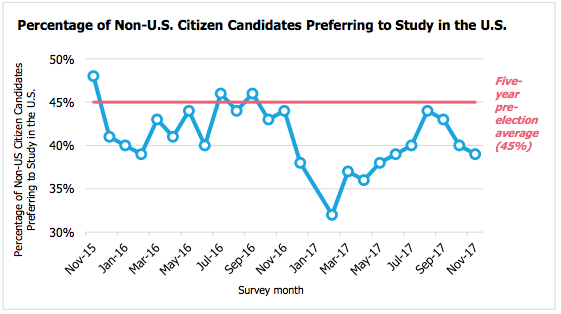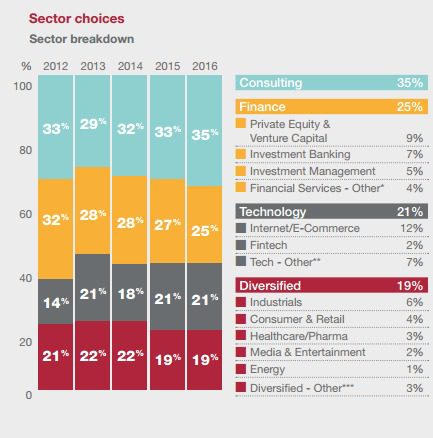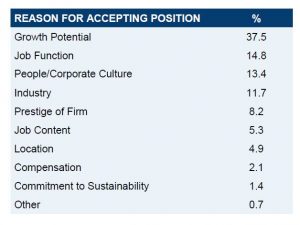Are International MBAs Avoiding the United States?

Based on data from the most recently Graduate Management Admissions Council (GMAC) monthly survey, interest in U.S. business schools among international MBA candidates is still below pre-2016 election levels. In fact, it’s below the previous five-year average for each month since the election. And in each of the last three months—between September and November 2017—international application volume has decreased.

Image via GMAC report.
Just before Donald Trump’s election victory, approximately 46 percent of international MBA applicants surveyed by GMAC responded that they would prefer to study in the United States—above the 45-percent, five-year, pre-election average. But not once since November 2016 has that been the case. The percentage of international applicants indicating a preference for U.S. business schools plunged at the beginning of 2017, to below 40 percent in January and just over 30 percent in February. Summer 2017 saw a bit of a rebound—though never reaching 45 percent—but international interest has again declined this fall.
Of 1,992 non-U.S. candidates surveyed between September and November 2017, 23 percent shared that they had previously thought about applying to a U.S. program but have since changed their mind. As for the reasons behind applicant reluctance:
- 54 percent cited concerns about obtaining a job in the U.S. post-graduation
- 51 percent admitted concerns about gaining a student visa
- 47 percent cited safety and security concerns
- 42 percent talked about the political environment
- 39 percent admitted racism and discrimination fears
In addition, when GMAC surveyed nearly 700 U.S. MBA programs, about half admitted that they had received fewer international applications than in the previous year. Only 31 percent reported an increase in international applications. Another 20 percent reported no significant change.
For additional insights from GMAC as well as continued tracking of international candidate interest, visit the GMAC research website.
This article has been edited and republished with permissions from our sister site, Clear Admit.
DeGroote 2016 Annual Report Reveals Positive MBA Stats

2016 was a notable year at McMaster University’s DeGroote School of Business. Not only did the school continue to foster interdisciplinary thinking and evidence-based management to transform business and society, but it also experienced quite a few accomplishments. Those accomplishments were summarized in the DeGroote 2016 Annual Report, with some of the most impressive outlined below. Continue reading…
LBS Employment Report Finds Grads Falling Out Of Love With Finance

London Business School MBA graduates may be seeing higher salaries and increased hiring rates, but its love of the finance industry may be waning.
According to the 2016 London Business School employment report, MBA grads are joining the financial sector at the lowest rate in five years. LBS grads are still joining the industry at 25 percent overall, which trails the 35 percent of graduates that enter consulting. Technology, which hired the third-most LBS 2016 graduates, came in third at 21 percent—the same percentage from the previous year.

via London Business School Employment Report 2016
Goldman Sachs, which typically hires the most LBS MBAs that move into the financial sector, only hired six employees from the 2016 class, down from nine the previous year. Credit Suisse and Citi Bank also hired less grads than the previous year. This all comes despite the fact that the aforementioned companies hired several more total summer interns, but did not retain them. For instance, Goldman Sachs took in 13 interns but only hired six employees—creating a retainment rate of only 46 percent.
Another marked difference is the slightly noticeable decline in finance hires joining private equity firms rather than traditional investment banks. 2016 marked the first year—ever—that more joined private firms, with nine percent of graduates compared to seven percent joining investment banking. These figures fall in line with trends that have persisted since the financial collapse of 2008. eFinancialCareers debuted a report in September of 2016 that found a steadily declining love between MBAs and traditional big banking.
If you’re in London in particular, therefore, the MBA-into-banking route has pretty much disappeared in 2016. Banks’ recruiters say it’s the culmination of a long term trend. ‘This has been going on since 2008,’ says one, speaking off the record. ‘Once things got tough, MBAs just weren’t seen as value for money any more.’
Despite the dampening of the overall numbers, salary rates saw a noticeable bump for finance industry hires. The average annual salary of 2016 grads jumped from £78,358 to £81,905, with the highest max salary leaping from £125,468 to £151,469.
Consulting Hires Jump
The total percentage of LBS graduates joining the consulting industry jumped moderately from 33 percent in 2015 to 35 percent last year, with the majority of hires joining Boston Consulting Group (BCG), McKinsey & Co. and Bain & Company. BCG specifically saw hires nearly double over the course of a year, improving from 19 to 34 total.
Like the financial sector LBS hires, salaries increased across the board for consulting industry MBAs. The average annual salary of those in the industry leaped from £79,773 to £83,268, although the highest salary tracked was £117,389—down from £121,824 in 2015.
The Incoming LBS MBA Class
A total of 411 new students will join LBS in 2017, ranging from 24 to 39 years of age. They enter the MBA program with an average of five years of professional work experience and a 701 GMAT score (up from 699 last year). As well, there is a moderate increase in female students and diversified nationalities. Accepted female applicants jumped to 37 percent from 36 percent, and 68 total nationalities are represented, up from 65 in 2015.
You can read the entire LBS 2016 employment report here.
MIT Sloan 2016 Employment Report Reveals Slipping Salaries

The MIT Sloan School of Management, late last week, released its 2016 Employment Report for MBAs, revealing slightly slipping salaries year over year and slightly lower percentages of graduates heading into consulting and technology than in prior years. The pharmaceutical/healthcare industry drew the third largest percentage of graduates—5.8 percent—knocking investment banking out of the top three for the first time—perhaps ever. Investment banks drew just 4.7 percent of the 2016 class, down from 6.1 percent last year, 6.8 percent in 2014 and 8.1 in 2013.
As it has for several years running, consulting snapped up the most MIT Sloan grads this past year, 30.5 percent, but that represents a second consecutive year of decline, from 33.9 in 2014 and 32.1 in 2015. The technology sector drew almost as many graduates as consulting—29.3 percent of the class. That was down slightly from 2015’s 30.7 percent, but an increase over 2014’s 26.1 percent and significantly up from the 19.2 percent that went into tech in 2013.
McKinsey and Amazon Compete with Founders’ Dreams
In terms of absolute numbers, more MIT Sloan ’16 MBAs headed off to work for McKinsey than any other company—26, or 6.6 percent of the entire class. Amazon was second, luring 23 recent grads. Falling right between these two top hiring firms were the 24 graduates not seeking employment because they were starting their own businesses, down slightly from last year’s 28 founders. Representing 6.1 percent of the graduating class this year (and 7 percent last year), the ranks of entrepreneurial founders at MIT Sloan rival schools like Harvard Business School, where founders made up 6.8 percent of the most recent class. But they still trail Stanford Graduate School of Business, with its whopping 15 percent of 2016 graduates who started their own ventures upon graduation.
The other consulting giants—Bain and Boston Consulting Group—drew the next largest contingents of recent grads, 17 and 14 respectively. Then came tech firms Microsoft and Google, snapping up nine and eight a piece. Bank of America Merrill Lynch was the sole investment bank named among Sloan’s top hirers in 2016, employing five recent grads.
Salaries Hover at or Below Prior Year Levels
As for how much money Sloan grads are bringing home, the median base salary for 2016 grads remained at 2015 levels, $125,000. The mean base salary for graduates heading into what MIT Sloan breaks out as service industries—consulting, software/internet, investment banking/brokerage, retail, private equity/venture capital, investment management, diversified financial services and media/entertainment—was $126,841, down slightly from the prior year’s $127,601. Grads heading into manufacturing industries—including pharmaceutical/healthcare, computers/electronics, consumer products, automotive/aerospace, oil/energy, telecommunications and transportation/equipment/defense—claimed a mean starting salary of $120,696, down from last year’s $123,416.
Fewer students—66.1 percent—reported signing bonuses in 2016 than the 75.3 percent who reported them in 2015. But 2016 saw a rise in the prevalence and amount of other guaranteed comp. This year, 22.1 percent of graduates reported receiving other guaranteed compensation, with a median of $23,401. The year before, only 18.8 percent expected other guaranteed compensation and the median was lower at $20,500.
The highest starting salary of the Class of 2016—$200,000—went to a student entering what MIT Sloan categorizes as “Manufacturing, Other,” explaining in a footnote that other refers to manufacturing, telecommunications, and transportation/equipment/defense. The lowest, $50,000, went to a grad heading into the retail industry.
MIT Sloan breaks out signing bonuses not by industry but by function. The highest signing bonus for this most recent group of grads was $77,000, awarded to a graduate who is now working in product management/development. The median signing bonus varied depending on function, with leadership development/general management/consulting/marketing/operations roles coming in around the $25,000 mark but investment banking and “finance, other” (including corporate finance, finance operations, treasury and M&A) reporting median bonuses of $49,000 and $47,500 respectively. The median other guaranteed compensation, meanwhile, was $19,500, ranging from $100 at the low end to $89,380 at the upper limit.
Tech Tops Consulting for Second Year Running in Drawing Sloan Interns
A look at where MIT Sloan Class of 2017 MBA students chose to intern shows technology holding the greatest sway, with 29 percent of students heading to tech firms for the summer. This is down from 2015, when 33.2 percent headed into tech for their internships, but it still outdistances the consulting industry, which this past summer drew 21.9 percent. Unlike with full-time jobs, investment banking held onto the third spot in terms of attracting interns, drawing 8.1 percent of the class. Pharma/healthcare, which beat out investment banking in terms of full-time positions, attracted 7.4 percent.
Salaries for summer interns at Sloan edged upward slightly depending on the industry. For students interning in service industries, the median monthly pay was $8,000, no change from the summer before. But the mean monthly pay moved up to $8,633, from $7,771. For students interning in manufacturing industries, the median monthly salary stayed constant at $7,200, but the mean monthly salary dipped from $7,102 last year to $6,871 for the most recent crop of interns.
Timing of Job Offers, Reason for Accepting Jobs
In terms of the timing of job offers, 88.7 percent of MIT Sloan 2016 grads had job offers at the time of graduation, down from 91.5 percent the year before. But by three months out from graduation, 95.3 percent had offers, pretty much on par with the prior year’s 95.6 percent.

Source: MIT Sloan 2016 MBA Employment Report
A little dip in salaries may be no big deal for MIT Sloan grads, according to an additional set of metrics shared in the school’s employment reports. Unlike many peer schools, MIT Sloan includes statistics on why graduates accepted the jobs they did. Far and away the most important factor contributing to what job Sloanies accepted was potential for growth, cited by 37.5 percent of graduates. Job function was the reason reported by 14.8 percent, followed by company culture, cited by 13.4 percent, and then industry, named by 11.7 percent. Far fewer Sloanies accepted the jobs they did because of firm prestige (8.2 percent), job content (5.3 percent), location (4.9 percent), compensation (2.1 percent) or commitment to sustainability (1.4 percent).
View the complete MIT Sloan 2016 MBA Employment Report here.
This article was edited and republished with permissions from Clear Admit.
Cass Talks 2016 MBA Success

At the end of each year, Cass Business School at City University London looks back at their MBA success for students and alumni. For 2016, Dr. Sionade Robinson, the Associate Dean of the MBA Programs, had a lot of top news and events to celebrate. Continue reading…
MetroMBA’s Favorite Chrome Extensions of 2016

2017 is almost here, but that doesn’t mean there aren’t some more ‘Best Of 2016’ lists worth browsing. Here, we take a look at our favorite Google Chrome browser extensions.
